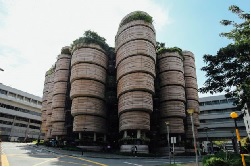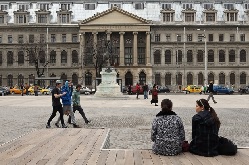June 2017 Research, Science and Knowledge
Read the articles selected in June 2017
Modernisation of Higher Education in Europe: Academic Staff-2017
Source: http://www.eua.be/, 15 June
This report of the EC goes through the changing higher education landscape, put under pressure by the increasing societal demand for higher education and the shift from centralized statal control towards new forms of funding models and quality assurance systems, highlighting the need for more institutional autonomy.
See attached
Who makes it into Pisa?
by Nicholas Spaull
Source: http://www.oecd.org, 19 June

A country’s ranking in PISA has to take account not only of the test scores but also of the improvement in access to education and of the lower rates of dropout in disadvantaged students since the advantaged ones are more likely to perform better in mathematics and reading.
Read more:
http://oecdeducationtoday.blogspot.it/2017/06/who-makes-it-into-pisa.html
Secrets to the success of the world’s fastest-rising university
by Ellie Bothwell
Source: Times Higher Education, 17 June

The secret to the success of Singapore’s NTU, leaped over 120 places in THE rankings within five years, has been a new tenure system that stakes on research strengthnening. Europe’s discourses about universities and research become reality in Singapore.
See attached
Supporting Europe’s Societies: Research and Innovation for the Ninth Framework Programme
Source: Time Higher Education, 20 June
The Guild for European Research-Intensive Universities calls for an increase to 130 bn euro of the budget for research and innovation in the next Framework Programme(FP9), to boost research excellence and maximise the circulation of ideas, addressing the social and educational impact of science.
See attached
European universities call for research funding boost
by Holly Else
Source: Times Higher Education, 20 June

European universities demand from the European Commission a marked increase over the current Horizon 2020 for the next funding programme, and to earmark a fixed percentage of structural funding to fund research as part of growth and development.
See attached
Ethics and open science in mix for researcher development rethink
by Holly Else
Source: Times Higher Education, 12 June

The European Charter for Research and the Code of Conduct for the Recruitment of Researchers, issued by the EC in 2005, are being updated. Intellectual integrity, open science, and ethics will be the guide-principles for career development, to evaluate taking account of research social impact.
University Autonomy in Europe III
by Enora Bennetot Pruvot & Thomas Estermann
Source: http://www.eua.be, 1 June
This report scores the autonomy performance of plural public education systems benchmarked to four fundamental dimensions, in the awareness of the different legal frameworks and cultural settings, providing data which can inform the reforms of modernization in European higher education.
Re-booting government as a bridge to the digital age
by Andy Wyckoff
Source: http://www.oecd.org/,
Digitalisation changes the way we seek to achieve our goals. The multidisciplinary nature of digital transformation is for governments a challenge to do better policies. The challenge of digital revolution isn’t so much about technology policy as about distributional policy, to not leave anyone behind.
Read more:
http://www.oecd.org/science/re-booting-government-as-a-bridge-to-the-digital-age.htm
Towards Knowledge Societies
Source: http://unesdoc.unesco.org
The Knowledge Society connects the different forms of knowledge in a public property, accessible to all, to foster a new model of growth and human development. Knowledge is not an ordinary commodity and plays a crucial role in a society strongly influenced by scientific language and technology.
The continued rise of East Asia and the Pacific in higher education
by Angel Calderon
Source: University World News, 9 June

The QSs 2017 rankings see the major competition between North America and Western Europe versus East Asia and the Pacific.While the US continues to dominate the rankings, Asian universities are challenging the standing of the prominent Western institutions.
Read more:
http://www.universityworldnews.com/article.php?story=20170609071914127
What are the hot research areas that might spark the next bing bang?
by Holly Else, Chris Hatherill & David Matthews
Source: Times Higher Education, 25 May

The most crucial topics of contemporary science don’t correspond to the headlines. A research front grows when a scientific literature defines a problem, and the high number of citation reveals an emerging field.
Time for a quantum leap in EU research funding-an editorial from EUA President Rolf Tarrach
Source: http://www.eua.be, 2 June
Although universities are protagonist in generating the knowledge that shapes our daily life and is the engine of sustainable development and economic recovery, the European research funding system still shows inefficiencies and needs a leap of quality and more quantitative effort.
Read more:
Business brief: empowering the next generation of scientists to change the world
Source: http://www.oecd.org
Ed Tech is useful to rethink conventions in education, through motivating and supporting immersive learning experiences. Virtual learning environments democratize learning to help poor performing students and bring education around the world, improving the opportunities for all individuals.
Read more:
http://www.oecd.org/science/business-brief-empowering-the-next-generation-of-scientists.htm
There’s no such thing as a “pure” European –or anyone else
by Ann Gibbons
Source: Science, 15 May

New methods for DNA analysis and isotopes tracked in bones and teeth are revealing that we are all the result of relatively recent migrations and mixing. Humans seem have always been attracted to strangers and the ethnic pureness is a myth, even for many indigenous groups.
Romania’s science reforms prompt boycott
by Inga Vester
Source: Nature, 6 June

Researchers in Romania are boycotting government reforms that submit science to the State control and to political influence in the grant process, withdrawing review panels formed by international scientists and retreating research from European and international participation.
Jacques Biot: “We must prepare our students for the fourth industrial revolution”
by Jacques Biot
Source: Times Higher Education, 27 May

To face the emergences of this era we need knowledge, produced by fundamental research and applied to industrial and technological scale. Universities should prepare the fourth industrial revolution with cross - multidisciplinary work and dedicated structures because no challenge requires only a single technique
See attached
Ambitious funding for excellent research in Europe post-2020
Source: http://www.eua.be
At a time when the political identity of Europe is being questioned, the institutions have to involve their citizens in a knowledge-based project, fostering the advancement of society in all domains. The role played by universities in leading innovation and in safeguarding our democratic and tolerant values is paramount.
Read more:
How mayors see the relationship between town and gown
by Nicola Jenvey
Source: University World News, 26 May

Universities and cities have been intertwined for hundreds of years. In the digital age and global interrelation, universities have new roles and responsibilities, involved in the world urbanization challenges. That requires a holistic approach and to pay attention to the needs of rural and peri-urban districts.
Read more:
http://www.universityworldnews.com/article.php?story=20170525184023264
Knowing and actively debating why, the heart of every policy
by Rien Rouw
Source: http://www.oecd.org/, 17 May

Like companies, also public services and education achieve their goals in organizing and communicating from their reason for existence. This is the secret of reforms success: engaging the local practices with the rationale of a reform is motivating for teachers and school actors and promotes a collaborative culture.
Read more:
http://oecdeducationtoday.blogspot.it/2017/05/knowing-and-actively-debating-why-heart.html
Info
- Pubblicato il : 19/12/2017 Modificato il : 04/04/2019
Allegati
- Research funding boost pdf
- Supporting Europe's Societies pdf
- Secrets to success pdf
- Modernisation of Higher Education pdf
- Knowledge Societies pdf
- University Autonomy in Europe III pdf
- Ethics and open science pdf
- Romanian science reforms prompt boycott pdf
- There is no pure European or anyone else pdf
- What are the hot research areas? pdf
- Jacques Biot pdf

